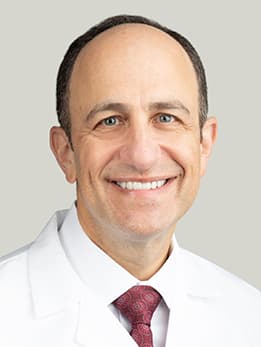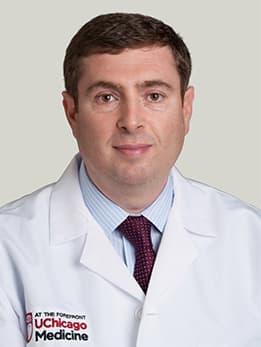IBD experts help teacher with ulcerative colitis

Each spring, Abbie Perkovich completes the Presidential Youth Fitness Challenge with her fifth-grade students. But just a few years ago, the thought of accomplishing this fitness feat—which requires participants to do 40 sit-ups in a minute, 20 push-ups without stopping, and run a mile—was hard to imagine.
Perkovich had been sidelined by inflammatory bowel disease. Her medications were no longer keeping the disease under control. Doctors thought her best option was to have her colon (large intestine) surgically removed—a process that requires several major operations.
The teacher, from Dyer, Ind., was first diagnosed with ulcerative colitis at the age of 21. Ulcerative colitis is a type of inflammatory bowel disease that causes inflammation in the lining of the colon and rectum. Perkovich's symptoms—bleeding, abdominal pain and urgency to use the restroom—led her to nationally recognized gastroenterologist David T. Rubin, MD, at the University of Chicago Medicine Inflammatory Bowel Disease Center.
"Dr. Rubin helped me at a time when I was not really under my parent's care, but not yet an adult," Perkovich said. "He was much more knowledgeable than any other doctors I had seen. He asked me the right questions. And I always felt that he heard me and cared about me."
Abbie's story is one that reminds us of the great advances that have occurred in treating IBD, but also of the need for us to continue developing even better approaches to fighting these diseases.
The medications Rubin prescribed kept Perkovich's symptoms in remission for several years. But after a bad flare-up in 2006, Rubin decided it was time for a new treatment plan. He recommended that Perkovich receive intravenous steroids and then start on Remicade, a much more powerful drug that requires regular infusions.
Again, the medication provided temporary relief. However, it wasn't long before her medical team was looking for another solution. Perkovich's body had slowly built up antibodies to the drug, causing the medicine to lose effectiveness. In 2010, her symptoms returned with increased severity and Rubin admitted her to the hospital.
A colonoscopy showed severe inflammation in Perkovich's entire colon and rectum. Rubin discussed the findings with Perkovich and her husband, John, telling them: "The steroids aren't touching the inflammation." Surgery was her best chance for success.
A surgical solution
Although surgical intervention usually is a last resort, it often is an effective treatment for patients with severe ulcerative colitis. It serves as a cure because it removes the diseased colon. For Perkovich, that would mean no more GI bleeding, steroids, toxic medications, or "gut-wrenching, knee-buckling pain."
Citing her trust and confidence in Rubin, Perkovich decided to proceed with the surgeries. After 10 years under Rubin's care, she was referred to colorectal surgeon Konstantin Umanskiy, MD, of UChicago Medicine.
Perkovich remembers she immediately felt a sense of ease around Umanskiy. Due to the severe inflammation, Umanskiy recommended that the removal of Perkovich's colon and the building of an internal reservoir be completed over the course of three surgeries. This three-stage approach would take nine months, allowing Perkovich to recover between procedures and resulting in a better long-term outcome.
The first surgery took place in January 2010. Umanskiy removed Perkovich's large intestine and created an ileostomy. An ostomy allows stool to pass through the abdominal wall and into a detachable pouching system.
Although Perkovich had several setbacks during the initial recovery, Umanskiy and Rubin worked together every step of the way to problem-solve and get her back on track.
A few months later, Perkovich was ready for the second procedure. Umanskiy created an internal reservoir, also known as a J pouch, using the end portion of her small intestine. After the final surgery, which took place in September, Perkovich's body began to store waste in the pouch and eliminate normally again. In each case, Umanskiy used minimally invasive laparoscopic techniques to reduce pain, scarring and recovery time.
"Abbie had ups and downs during her surgical journey," Umanskiy said, "but she never lost her positive attitude. She even cheered on our surgical team along the way."
The last step of the challenge
Recovery after her final surgery was slow but steady. With the help and support of her husband, Perkovich returned to the classroom. Little by little, she regained her strength and was able to enjoy being her "sporty" self again.
"It took me a long time to get my health and fitness level back," she said. "Remembering when I couldn't climb the stairs in my house motivated me."
Her fifth-graders served as another source of motivation. She has completed the fitness challenge with her students each year since her surgeries. Proud of how far she had come since that first surgery, Perkovich sent a picture of her Presidential Fitness award to Rubin.
Today, Perkovich runs 5K races, attends kickboxing class, and plays tennis. She loves teaching and says that her students continue to inspire her every day. She also enjoys educating others by sharing her perspective with patients who are considering the same surgical solution. Though there were some complications along the way, Perkovich says her health is great and she feels better than she has in her entire life.
"There were many times I felt weak, scared, and yes…a bit sad," Perkovich recalled. "Now what I feel is thankful: thankful for life, thankful for the advances in medicine, and thankful that the pain is gone."

David T. Rubin, MD
Dr. Rubin specializes in the treatment of digestive diseases. His expertise includes inflammatory bowel diseases (Crohn’s disease and ulcerative colitis) and high-risk cancer syndromes.
See Dr. Rubin's physician bio
Konstantin Umanskiy, MD
Dr. Konstantin Umanskiy specializes in the surgical treatment of a wide variety of colon and rectal diseases such as colon and rectal cancer, inflammatory bowel disease (ulcerative colitis and Crohn’s disease), complex anorectal disorders and diverticulitis.
